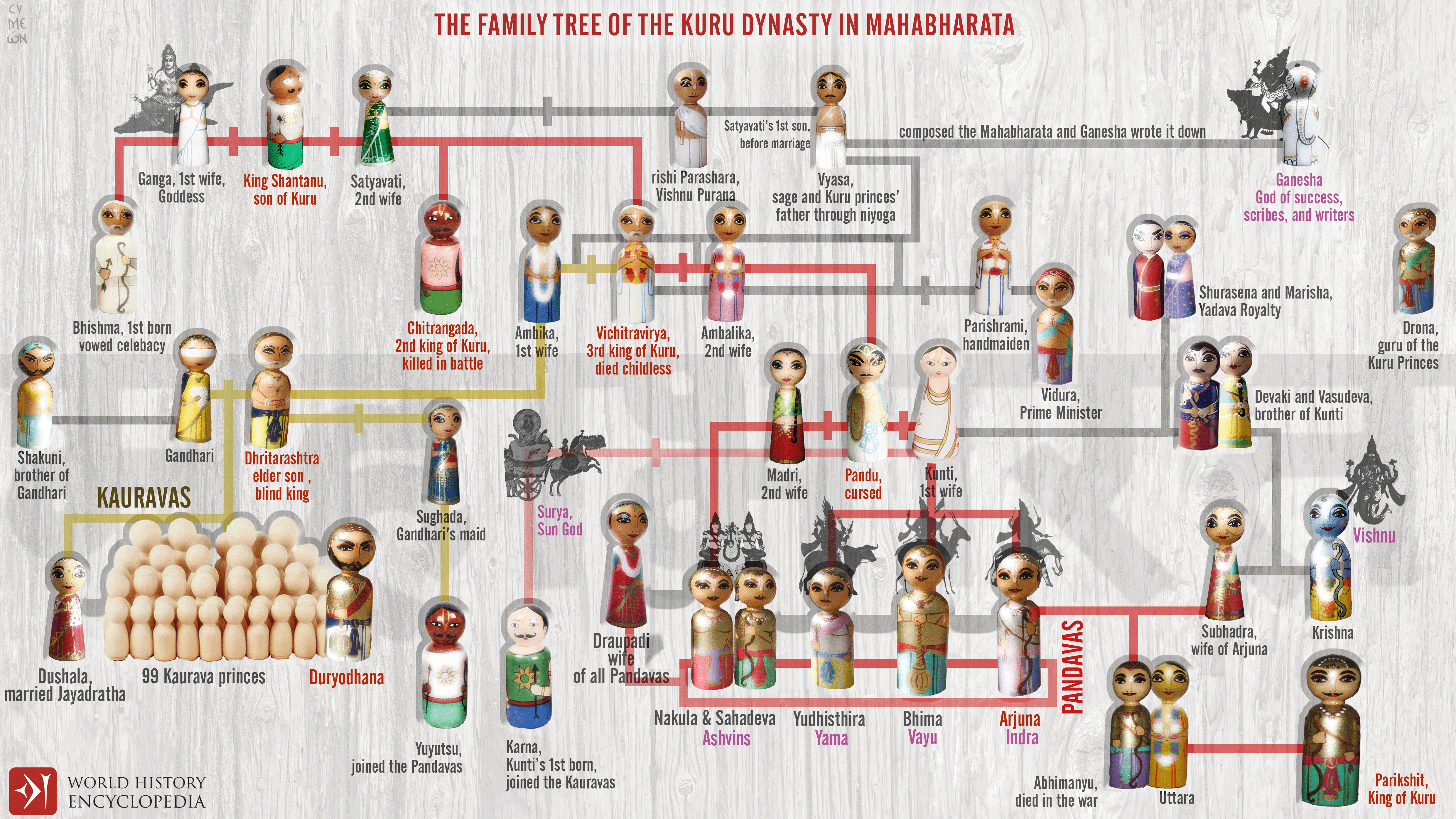The Mahabharata is an ancient poem and is still the longest epic poem ever written. The story is about the descendants of an ancient emperor called Kurukshetra which means the field of Kuru. The story is still well known and beloved because the story and the characters are always relevant and relatable.
“What is found here may be found elsewhere. What is not found here will not be found elsewhere.” – Mahabharata
The story tells of a dynastic struggle for the throne of Hastinapur, a kingdom ruled by the Kuru clan. The two collateral branches of the family that participate in the struggle are the Kaurava, the elder branch, and the Pandava, the younger branch.

Characters from the Mahabharata and their lineage
The Mahabharata is more than just a story of kings and princes and sages and demons and gods. The main aim of the work is to illicit the four Purusarthas, or goals of life.
- Four Purusarthas
- Kama (Pleasure)
- Artha (Wealth)
- Dharma (Virtue or Duty)
- Moksha (Liberation)
Pandu and Dhirtrashtra were two brothers who ruled Hastinapura. Pandumarried Kunti and Madri, but he could not sire a son. Kunti had a boon which allowed her to invoke any gods she worshipped to give her a son. Before she married Pandu, she accidentally invoked this boon and gave birth to Karna, who she abandoned for fear of being an unwed mother. She invoked this boon again and bore three sons: Yudhisthira, Bhima, Arjuna. She then shared her boon with Madri, who then gave birth to the twins, Nakula and Sahadeva.
Dhirtrashtra, who was blind, married Gandhari who gave him 100sons, including Duryodhana. After Pandu died, Dhirtrashtra decided to give the empire to Yudhisthira much to the chagrin of Duryodhana, who plotted to kill them in a palace made of wax, but the brothers and Kunti managed to escape and lived incognito in a forest where Bhima met the giantess Hidimbi. He slayed her brother, married her and sired a son named Ghatotkacha.
The brothers and their mother continued their journey the kingdom of Panchala. There, Arjun won a competition to wed the princess of Panchala, Draupadi. Kunti unwittingly asks the brothers to share Draupadi. When they returned to Hastinapura, Dhirtrashtra acknowledged the enmity between the cousins and asked the Pandavas to re-locate to the desert, Khandaprastha, which they accepted and subsequently transformed to a magnificent land with the help of Krishna, and renamed Indraprashta.
Duryodhana was seething with jealousy and humiliation when he visited the palace of the Pandavas. He then invited the five brothers to play dice at Hastinapura, where, through the trickery of his uncle Shakuni, Yudhisthira lost the game, Indraprashta, his brothers, his wealth as well as Draupadi herself. Krishna came to her aid when one of the Duryodhan brothers, Dushashana, publicly disrobed her as no one came to her defense. The Pandavas were then sentenced to 13 years in exile, which would be extended another 12 years if they were discovered during the 13th year.
The 13 years passed by, Arjun also got married to Subhadra, Krishnas younger sister and sired a son, Abhimanyu. Each of the Pandavas had taken on other wives apart from Draupadi, although Draupadi remained as the main wife of all of them. When the Pandavas returned to re-claim Indraprashta, the Kauravas opposed and challenged them to a war in Kurukshetra.
Main Characters
KUNTI
- Princess of Mathua
- Received a boon to invoke any god to give her a child.
- She bore Karna before her marriage, and abandoned the baby
- The first wife of Pandu
- Mother of the three oldest Pandava brothers: Yudhisthira, Bhima and Arjuna.
- Kunti took on Madri’s children, the twins Nakula and Sahadeva, and raised them along with her own sons.
THE PANDAVAS
- The Sons of Pandu
- The five Pandavas means “the five sons of Pandu.”
- They are the sons of Pandu from his wives, Kunti and Madri.
- Although Pandu is their “official” father, the Pandavas are the sons of gods.
- Yudhishitira
- The oldest son
- Born from Yama, the god of wisdom
- Symbol of the Dharma (virtue).
- He represents wisdom.
- Bhima
- The second born
- Son of Vayu, the god of wind.
- He represents strength.
- Arjuna
- The third son
- The son of Indra, the god of rain.
- He represents faith.
- The twins, Nakula and Sahadeva
- Born from Madri and the Ashvinis
- The twin gods of healing.
- Nakula represents love
- Sahadeva represents intelligence.
- Yudhishitira
DRAUPADI
- Princess of Panchala.
- Born out of a sacrificial fire.
- Common wife of the Pandavas.
- Bore one son out of each of her husbands.
KARNA
- Born from Kunti and the sun god Surya.
- The abandoned child of Kunti.
- Raised by a charioteer and his wife as their own son.
- Although he was raised with love, Karna would forever struggle with his status as the lowly son of a charioteer in a society which still upheld a rigid class distinction.
- Became the King of Anga due to his friendship with Duryodhana.
- The best friend of Duryodhana, who is the cousin and sworn enemy of the Pandavas.
- Fought against his own brothers (the Pandavas) in the great war in Kurukhsetra
…..To Be Continued
